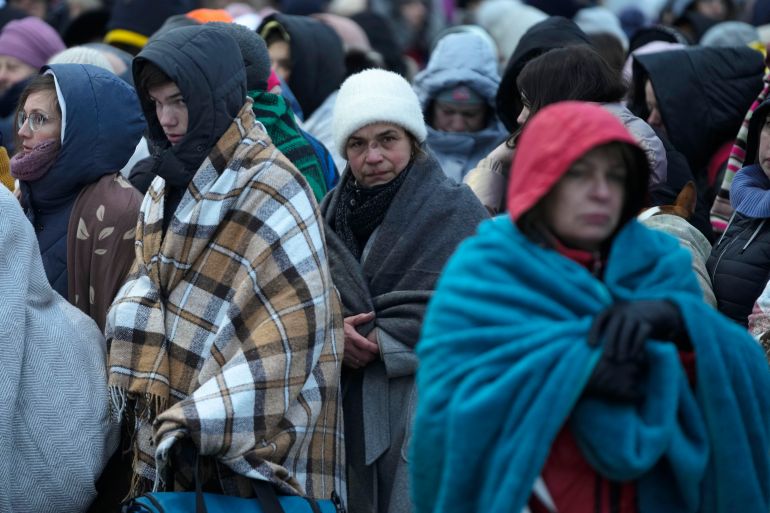Not only Ukrainians, but all refugees deserve compassion
Where were all these politicians, corporations, universities and caring citizens now standing in solidarity with Ukrainians when my village in Ethiopia was burning 11 years ago?

It has been more than a month since Russia embarked on an all-out invasion of Ukraine. A whole nation has been in despair since troops started moving towards Kyiv on February 24. Entire towns have been destroyed. Tens of thousands have perished. And more than four million people had to flee their homes to seek safety in neighbouring countries.
Day after day we watched tragic, but somewhat familiar, scenes on our screens: mothers running with babies in their arms, families searching for their possessions in the rubble of their homes, thousands of desperate refugees crowding border zones.
But among the footage from Ukraine, there were also some not so familiar scenes: border guards of neighbouring countries welcoming refugees with open arms; citizens hosting Ukrainians in need of accommodation in their own homes; politicians giving speech after speech outlining what they will do to help those fleeing the war; universities offering places to students from Ukraine so they can continue their studies.
I was, of course, pleased to see the world unite to support Ukrainians. As someone who knows the horrors of war all too well, I sympathise and stand in solidarity with all those fleeing Russia’s brutal invasion. But like so many people who have had to flee a war, as I watched the Ukrainian refugee crisis unfold, I could not help but ask: Where were these world leaders, corporations and universities when armed invaders attacked and burned my village just 11 years ago? Where were the people of goodwill offering for me to stay with them instead of being stuck in a refugee camp for a decade?
I have known forced displacement and war all my life. I was born and raised in a small village in Ethiopia where my father had settled after fleeing the first Sudanese civil war. When I was young, my father told me countless stories about his life in South Sudan. He told me not only about the beautiful village by the Nile where he spent his childhood, but also about the times he had to run and hide from helicopters dropping bombs.
In 2010, my father’s story became my own. My small village in Ethiopia was attacked by armed militias, and I became a refugee. Eleven years later, I am still a refugee. All my family members are still refugees. I am lucky to be living and studying temporarily in Canada, but my family is still stuck in a refugee camp.
The war did not just steal my home and my childhood. It stole my family’s future.
How different our lives would be now if the world had responded to my father’s cry for help some five decades ago with the same compassion and care it is now offering to Ukrainians? Or 11 years ago, when our village in Ethiopia was attacked?
My family and I are in no way part of an unlucky minority. According to the United Nations, before the beginning of the invasion of Ukraine, there were already an unbelievable 82.4 million forcibly displaced people across the world.
That is, actually, more people than the entire population of Ukraine.
In each refugee camp, each IDP (internally displaced people) camp, and each less formal refugee settlement, from Ethiopia to Bangladesh and Lebanon to Mexico, there are countless children, men and women who want nothing but safety, stability and a place to call home permanently. There are teachers, doctors, engineers, entrepreneurs, students, mothers and fathers who just want to leave the pain and suffering of the past behind, live their lives and contribute to society.
From the very first days of the Ukraine crisis, we have seen that the international community can come together to alleviate the suffering of those fleeing war. People can – when they want – respond to refugees at their countries’ borders with compassion and love, rather than suspicion, fear and indifference.
Of course, the world’s response to the Ukraine refugee crisis was also less than perfect – but it was much, much better than what we have seen in the past. And it showed us what is actually possible.
It showed us that the international community can embrace those fleeing war. That the governments can swiftly set up safe pathways for those seeking refuge. That universities and schools can offer places to refugee children to ensure they do not have to give up on their futures due to war and hardship. That common citizens can step up and speak up so the human rights of refugees in their countries are respected.
As the war in Ukraine continues, I cannot help but fear the international community will soon get used to the situation in Ukraine – like it got used to the endless wars in many other countries – and turn its back on Ukrainians in need. I also fear that once this crisis is over, governments and people who suddenly showed care and compassion to refugees will return to business as usual – they will continue to ignore the plight of those fleeing war, conflict and hardship elsewhere in the world.
Many have argued those in the West welcomed Ukrainian refugees with open arms only because they looked like them – and maybe this is true. But it does not mean it always has to be the case.
In the past month, the international community showed what it is capable of doing for people fleeing conflict. Let us not forget this, and repeat this successful example in other geographies and conflicts. Because every child, every human being, everywhere, deserves peace and a place to call home.
The views expressed in this article are the author’s own and do not necessarily reflect Al Jazeera’s editorial stance.
